The push for dual-class share listings does not mean the Singapore Exchange (SGX) will encounter more company failures and governance issues, according to senior exchange adviser Gautam Banerjee.
Mr Banerjee, who chairs the Listings Advisory Committee (LAC), told The Straits Times the new listing structure would not be a radical change as it is not expected to bring in a flurry of applicants, and sufficient safeguards will be in place.
"It's an option we want the SGX to have, so that when an applicant is indeed able to tick all the boxes, we will be able to accommodate it. We need to be ready now; it'll be too late to start when the case is in front of our door," said Mr Banerjee this week.
In contrast to the typical one share, one vote single-class structure, a dual-class share listing gives controlling shareholders voting power or other rights disproportionate to their holdings. Companies such as Google and Facebook are listed with a dual-class structure.
Mr Banerjee believes firms in the new economy and tech sectors, where founders want to retain control over the business and intellectual property after going public, will prefer a dual-class listing.
"But I think ultimately the structure will have a limited application (in Singapore). We are not opening the floodgate, and we are not doing this to cater to any specific company. Quite frankly, at the moment, I can't think of any suitable applicant the SGX should aim for," he added.
"Our default position is that the market will remain overwhelmingly a one share, one vote structure."
Mr Banerjee, who is also the chairman of Blackstone Singapore, chairs the 16-member LAC, which was set up almost a year ago as one of three independent committees to help strengthen listing quality and regulatory processes.
In its annual report last month, the LAC said it backed the SGX's intention to allow dual-class share listings.
This was an almost unanimous decision after two committee meetings since April, Mr Banerjee said.
"We started the discussions after dual-class shares became allowed in the amended Companies Act, which came into effect in January.
"We want our stock exchange to be able to consider all sorts of structures. Given that we don't have a hinterland, the exchange needs its competitive edge, and the option to look at people who apply to us (for listing) with a very broad mind."
Some market watchers have criticised the move, saying it puts shareholder interests at risk.
Corporate governance expert Mak Yuen Teen told The Straits Times the SGX may give the perception that it is "willing to do anything to attract listings".
Mr Banerjee disagreed, noting that there are plenty of safety measures. At least for the foreseeable future, the LAC will assess the business and personnel of every applicant before recommending approval to the SGX.
Other safeguards proposed by the SGX - such as a maximum voting differential of 10 to one, prohibition of post-listing issuance of multiple-vote shares and mandatory compliance with the Code of Corporate Governance - will provide further assurance.
The exact rules and framework will be confirmed after a public consultation, which has yet to begin.
Ultimately, the quality of listings and corporate governance is not tied to any particular share structure, Mr Banerjee added.
"The current single-class structure hasn't prevented all company failures. You need more than just voting power to have good governance. It's often already too late when a shareholder has to vote to disagree at an annual or extraordinary general meeting."
He added that the laws and institutions here are mature enough to provide active checks and balances against errant companies, but he also urged independent directors to take a more active role.
"We have to get people sitting on listed company boards to take their fiduciary duties very seriously, to spend more time and get to the bottom of things," said Mr Banerjee.
"Some have said that that's asking too much of independent directors - but they simply have to do more."


